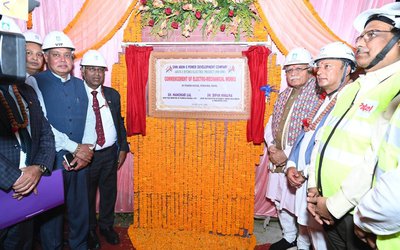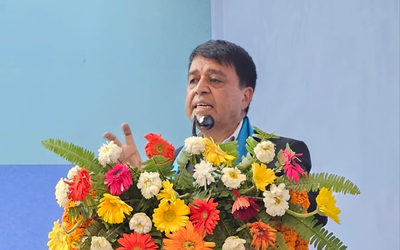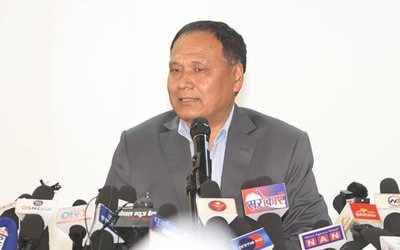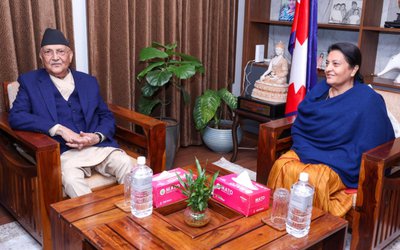
Bracing for possible hitches from its southern neighbor, which has boycotted OBOR along with Bhutan, Nepal signed the agreement to enter the process twenty hours before the summit.
Just a day before the departure of a 3-member ministerial delegation to Beijing, led by deputy prime minister and finance minister Krishna Bahadur Mahara, along with Minister for Physical Infrastructure and Transport Ramesh Lekhak and Minister for Information and Communications Surendra Kumar Karki, foreign secretary Shanker Das Bairagi and Chinese Ambassador to Nepal Yu Hong signed the MoU on behalf of their respective governments in Kathmandu.
Attended by over 100 countries and 29 heads of state and government, the OBOR summit was one of the biggest events hosted by Nepal’s northern neighbor to boost, industry, connectivity and investment in the world, including South Asia.
As it shares borders with five South Asian countries, China can change the economic game in the region. However, how China and India will come up to address their growing rivalry will direct the benefits for a country like Nepal.
With the signing of the agreement, there was a hush-hush in India. Nepal’s envoy to India Deep Kumar Upadhyaya said New Delhi’s reservations with OBOR were mostly about China-Pakistan Economic Corridor.
“Nepal will never give India any reason for grief but it cannot remain indifferent to a big economic power like China as it seeks more foreign investment and development,” said Upadhyaya.
“MoU is an umbrella agreement that sets the ground for promoting cooperation between the two countries in various areas of interest. “Enhancing connectivity, trade, investment, and promoting cooperation in culture and capacity building are among the major components of the MoU. This lays a foundation for Nepal to negotiate sector-wise agreements in future,” said foreign minister Dr. Prakash Sharan Mahat.
The signing of the MoU comes after prolonged indecision and hesitation on the part of Nepal. India’s decision to stay away from the initiative had reportedly placed Nepal’s decision makers in a situation of uncertainty.
The high-level delegation led by deputy prime minister and finance minister Krishna Bahadur Mahara presented Nepal's views on the first Belt and Road Forum for International Cooperation in Beijing on May 14.
Justifying its decision to join China's "One Belt, One Road" project despite India's opposition, Mahara said it could not ignore China as the latter was not just an economic powerhouse but also its neighbor.
The major thrust of the MoU is to promote mutually beneficial cooperation between Nepal and China in various fields such as economy, environment, technology and culture.
“The MoU aims at promoting cooperation on connectivity of facilities, trade connectivity, financial integration and connectivity of people. The MoU seeks to strengthen cooperation in connectivity sectors including transit transport, logistic systems, transport network and related infrastructure development such as railway, road, civil aviation, power grid, information and communication,” said a press release issued by Ministry of Foreign Affairs.
Similarly, the MoU also aims to promote people-to-people exchanges of different levels between the two countries. The MoU contains detailed framework for mutual cooperation in line with the MoU signed between the Governments of Nepal and China in December 2014.
DPM Mahara expressed happiness over the signing of MoU on Belt and Road Initiative. Mahara delivered his speech on a thematic session, Connectivity of Development Policies and Strategies. “After joining the Belt and Road Initiative Nepal will have more opportunities to promote foreign investment, improve connectivity and develop infrastructure, among others,” said Mahara.
“We expect benefits, especially infrastructure development, market access and tourism would be possible after connecting Nepal to China transport network."
With weak infrastructure, South Asia has been facing huge challenges to boost the region's economy. China’s One Belt, One Road (OBOR) initiative has set into motion game-changing strategies that will lead to free trade agreements, economic integration, physical infrastructure plans, shared growth and structural reforms, all in tune with future demands.
“The MoU seeks to strengthen cooperation in sectors including transit transport, logistic systems, transport network and related infrastructure development such as railways, roads, civil aviation, power grid, information and communications,” said Foreign Secretary Bairagi.
“Over 100 countries and international organizations have supported OBOR and 40 countries and international organizations have signed cooperation agreements with China," said Chinese ambassador to Nepal Yu, addressing the signing ceremony.
The two day OBOR Summit in Beijing came to an end with Nepal taking part in the summit by sending a high-level delegation. How Nepal benefits from OBOR will be determined by how the regional powers play their roles.

Keshab Poudel
Poudel is the editor of New Spotlight Magazine.
- KUL MAN GHISING: Bowing Down To The People
- Apr 13, 2025
- POLITICAL VIOLENCE: Culture of Impunity
- Apr 11, 2025
- PM OLI MEETS PM MODI: No Progress
- Apr 09, 2025
- PM OLI’S THAILAND VISIT: Flip Flop
- Apr 08, 2025
- FM Dr. Deuba’s India Visit: Mission Aborted
- Mar 26, 2025















